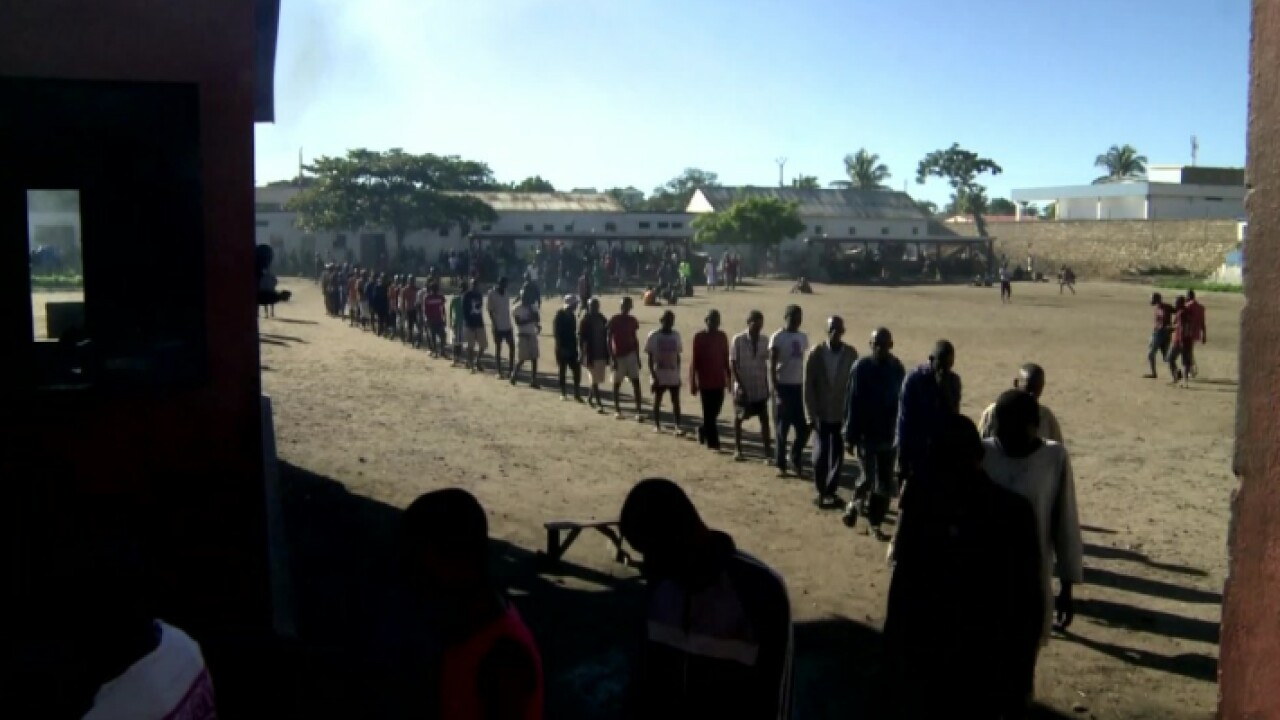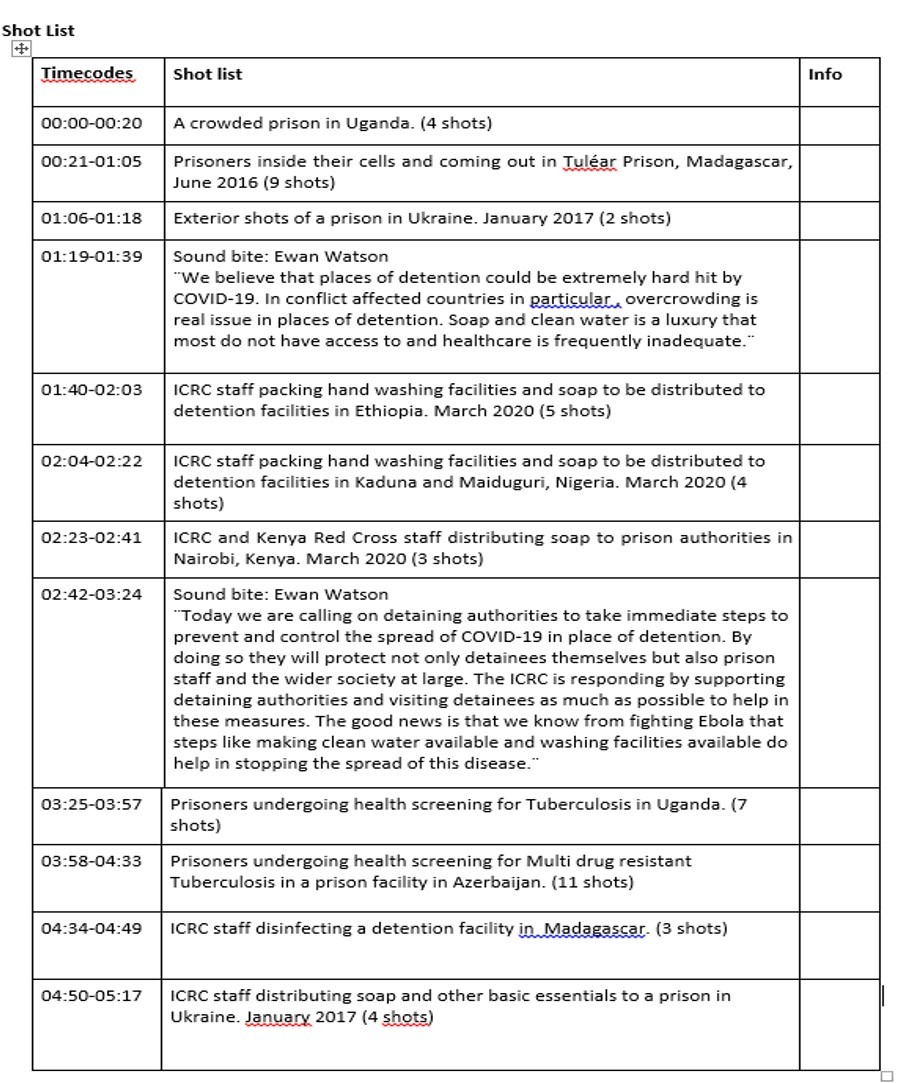COVID-19: Authorities must protect health of detainees, staff and ultimately surrounding communities

This is a modal window.
Geneva (ICRC) – Detaining authorities around the world who have not yet taken measures to prevent and mitigate the effects of COVID-19 inside places of detention are urged to do so immediately to protect the health of detainees, staff and wider society.
The International Committee of the Red Cross fears that places of detention may be hit hard by the pandemic as detainees are particularly vulnerable to the spread of COVID-19. Clean water can be a luxury while soap, chlorine and other necessary equipment may not be available in many places of detention, particularly in low-income countries or those affected by conflict. Such facilities are often overcrowded, which prevents physical distancing. They may also lack ventilation and have insufficient health care, contributing to the easy transmission of infectious disease.
"Prisons are not walled off from the world when it comes to disease transmission. Viruses can enter and leave a detention facility through family visits, detention staff, delivery personnel and detainees who enter or leave when newly sentenced or going to court. Detainee health must be protected, not only because it's the right thing to do, but also for the good of wider society," Vincent Ballon, the head of ICRC's detention unit.
Prison authorities everywhere are urged to implement infection prevention and control measures. We know from experience that improving access to clean water, hygiene materials and other measures such as the setting up of hand-washing stations can prevent the spread of disease inside and outside detention facilities. Places of detention need to adapt their daily routine to mitigate the risks of contamination while preventing excessive and unnecessary disruption of the daily life of detainees. The ICRC has seen such measures prevent the spread of Ebola and cholera in prisons.
The Geneva Conventions require that prisoners of war and civilian internees are entitled to regular medical inspections to supervise their state of health and detect contagious diseases. The Conventions provide direction to ensure isolation wards in order to prevent the spread of contagious diseases if necessary. Isolation and segregation measures must be humane at all times, and not prevent the right of detainees to contact with the outside world.
The ICRC works together with relevant authorities to strengthen standard practices such as the medical screening of new arrivals and the setting up of hand washing stations for detainees, visitors, staff and delivery personnel. We also support disinfection measures, such as fumigation campaigns, and distribute soap and other hygiene and cleaning materials to detainees. The ICRC also improves sanitation and other infrastructure in prisons.
"The problems and shortcomings in detention systems that worried us before COVID-19 have not gone away. These weaknesses may unfortunately increase the health risks for detainees and staff if COVID-19 enters places of detention," Mr. Ballon said.
Family contact is a vital emotional and psychological support for detainees. COVID-19-related restrictions have made family visits more difficult, adding stress for families and detainees during this difficult time. The ICRC is encouraging and when necessary supporting detaining authorities to put in place alternative ways for detainees and family to communicate, including phone and video calls. Such contacts are important for the peace of mind of detainees and family. This is why the ICRC encourages the authorities to ensure regular and transparent communication with detainees and their families on the reasons, the modalities and the duration of the restrictions implemented.
Reducing the number of people in prison can definitely help reduce COVID-19 risks. Based on its work in addressing situations of overcrowding and advocating for non-custodial measures and alternatives to detention, the ICRC has brought various options to the attention of States, judiciaries, prosecutors and detaining authorities, helping them to think through and balance the many complicated factors involved in such decisions.
Additional information on corresponding footage:
- In Nigeria, the ICRC distributed COVID-19 information posters in English, Hausa and Kanuri languages in seven detention facilities. It is also installing handwashing stands and distributing soap and jerry-cans in five places of detention.
- In Kenya, the ICRC, together with the Kenya Red Cross, is working with the Kenya Prison Services to prevent the spread of COVID-19 into 48 men’s, women’s and juvenile prisons. This includes more than 60,000 bars of soap as well as handwashing stations, disinfectant gel, and health education to inmates and prison staff on COVID-19.
- In Uganda, the ICRC supported Ugandan authorities to run health projects in prisons that led to significantly increased cure rates of tuberculosis, a drop in the number of malaria cases, and lower HIV/AIDS mortality rates.
For further information, please contact:
English/French: Ewan Watson, ICRC Geneva
+41 79 244 64 70 ewatson@icrc.org
English: Crystal Ashley Wells, ICRC Nairobi
+254 716 897 265 cwells@icrc.org
French: Halimatou Hamadou, CICR Dakar
+221781864687, hamadou@icrc.org
More info here https://www.icrc.org/en/what-we-do/covid-19-pandemic
SHOTLIST
Location: Multiple
Language: English
Length: 5:06
Format: mp4
Camera: Multiple
Editor: Eric Chege
Filming date: Multiple
Copyright: ICRC access all




